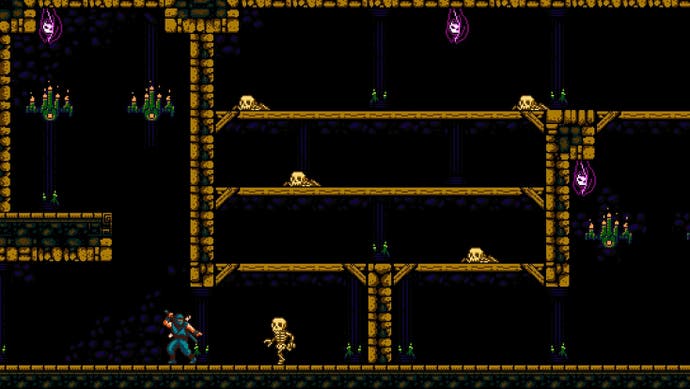The Messenger is modern retro done right
Ninja theory.
I didn't realise, until I started playing The Messenger last week, that I had started to see this kind of game as a bit of a chore. The kind of game I'm talking about is the rigorously observed reconstruction of an 8-bit style of gaming, right down to the limited colours, three-slot save system and chugging, popping, tweeting sound effects. And I only realised I had started to see all this as a chore because I found I was surprised, an hour or so in, to be enjoying myself so much.
I am still a bit confused about it all, to be honest. I don't think it's the games I've played that have put me off. I loved Retro City Rampage, which managed to reimagine a modern open-world adventure for the era of the NES, and since then I have happy memories of a handful of similarly styled platformers and Castlevania knock-offs. They do start to blend a little, though, once they're left in the memory: I'm left with a generalised sense of artful glitches and anachronistic leetspeak.
And then, I guess, my own associations come in to muddle everything further. We're venerating these games rather than trying to do new things, we're making a brief period of gaming into a golden age at the expense of the present and, with that, focusing on a handful of attributes - difficulty, ninjas - and in some way limiting what games are.
All this is rubbish, of course, and The Messenger is a lovely reminder of just how joyous this kind of gaming can be. You're a ninja, of course, and your mission is to race across an 8-bit island taking a letter to...someone or other who really needs to receive it. I forget. It's hardly important, anyway, because as soon as I set off I was swept up with a deeply ingratiating rush of old school memories, shot through with modern sensibilities.
This is the key, I think: the careful platforming gauntlets are just as I remember, right down to the stilted animation on running water and the inscrutable blobs of pixels that make up most enemies (all of whom regenerate once killed the moment you move back to an earlier screen). But on top of that is regular save spots and a neat set of upgrades that are actually worth unlocking.
The saves alone make such a difference. Suddenly I can enjoy the neat designs of bosses that are created in order to showcase a few clever gimmicks rather than bludgeoning me with restarts and backtracking. Suddenly I can take a punt on seeking out the hidden areas scattered around the game world.
It helps that the game is built around a single platforming idea. You can perform a double-jump if you can land an attack while in mid-air. If you can keep landing attacks, you can keep jumping. This brings a wonderful briskness to the game's busy screens - suddenly these are places that encourage acrobatic risks and speedy movement. Suddenly, The Messenger is a game that combines an 8-bit aesthetic with something fast and flexible and driven by the player's whim.
I suspect The Messenger is a particularly harmonious blend of old and new, but regardless it's nice to be reminded that my ideas about a genre can be quietly wrong. There is real pleasure to be had in looking back in gaming - who knew? Everybody but me, I guess - and that's a message that's worth receiving.


